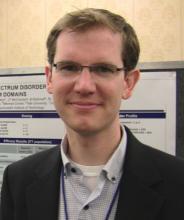BOCA RATON, FLA. – Social withdrawal and irritability significantly improved when children with autism spectrum disorder took arbaclofen, a new medication in development, according to an open label, multicenter study.
Boosted by promising results with arbaclofen in fragile X syndrome – the leading known cause of inherited autism spectrum disorder (ASD) – Dr. Jeremy M. Veenstra-VanderWeele and his associates launched a study with 32 children and adolescents.
This is the first step to determine whether the GABA-B agonist would help people with ASD who do not have fragile X syndrome, Dr. Veenstra-VanderWeele said in an interview at the annual meeting of the New Clinical Drug Evaluation Unit sponsored by the National Institute of Mental Health.
Children showed significant improvement on the Aberrant Behavior Checklist social withdrawal subscale, from a mean 18.1 at baseline to 12.6 after 8 weeks, based on an intent-to-treat analysis. In addition, the researchers rated more than half – 20 of the 32 kids – as "much improved" or "very much improved" on the Clinical Global Impression for Improvement measure.
At the same time, mean scores on the Aberrant Behavior Checklist Irritability subscale significantly improved from 24.7 to 17.3.
"We saw a lot of promising improvements in people who were taking the medicine," said Dr. Veenstra-VanderWeele, assistant professor in psychiatry at Vanderbilt University in Nashville.
"We did see some adverse events, as you would expect. None of these were terribly severe, and most of them looked similar to fluctuations in peoples’ baseline behavior," Dr. Veenstra-VanderWeele said. One severe adverse event was increased aggression during a planned taper of arbaclofen.
"The medicine was very well tolerated, especially in contrast to available medicines in autism, which, unfortunately, can have significant side effects," Dr. Veenstra-VanderWeele said.
Two participants discontinued because of increased agitation or aggression, and another five discontinued for other reasons, so 25 children and adolescents aged 6 years to 17 years completed the 8-week study. All participants met DSM-IV and Autism Diagnostic Interview (ADI-R) for autism spectrum disorder.
A double-blind, placebo-controlled study with up to 150 people is underway to confirm these results, Dr. Veenstra-VanderWeele said. When the Food and Drug Administration might approve arbaclofen for treatment of ASD is difficult to determine, he added. "The study initiating now will probably take about 6 months. Then I would anticipate there would be one more follow-up study if that study is positive."
"One really positive thing is this agent ... is closely related to a medication that has been available for decades: baclofen," Dr. Veenstra-VanderWeele said. "Because of that, the safety profile is fairly easy to predict, in contrast to a lot of investigational agents where you really have no idea going in."
Seaside Therapeutics funded the study. Dr. Veenstra-VanderWeele said he receives research funding from Seaside Therapeutics, Novartis, and Roche Pharmaceuticals.


